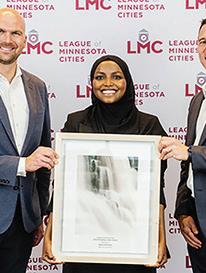


Development of a singlet for Muslim women wrestlers







Development of a singlet for Muslim women wrestlers



By Ashleigh Fields Black Press USA
President Joe Biden has successfully chartered the support of high-ranking Congress members with an endorsement from the Congressional Black Caucus. The group met with the leader virtually last week on Monday (July 11), eager to learn more about a campaign comeback plan after turmoil sparked by the June 27 presidential debate.
Biden pleaded with members reportedly telling them, “’I need you. I want you to be fully engaged.” Later he added, “You’ve had my back and I’ve got yours.”
Biden took questions from the lawmakers who represent 120 million Americans combined reaffirming his zeal for a second term.
“I will continue to stand with the president and the people who elected him to be our nominee. “He is the best candidate to be in this race,” Congresswoman Alma Adams (D-NC-12) told the NNPA after the call describing his current term as “extraordinary.”
The North Carolina representative’s support
will be crucial to Biden as he continues to visit the battleground state. Many are looking to see if his performance in Raleigh after the debate and frequent visits to Wilmington will seal the deal for voters who formerly sided with Donald Trump in the 2020 election.
The call with CBC members also served as a chance for the president to firm up his support in states like Nevada where he won by a slight margin in the last cycle.
Horsford says his constituents are looking for the nation’s next leader to make decisions that are cost-effective and financially fruitful. “The voters in Nevada care about a thriving and equitable economy, taking on big corporations to lower costs and protecting the hard-bought freedoms, rights, and opportunities we’ve Earned,” Horsford posted on X the day after the meeting. “They’re focused on moving forward and reject the divisive politics of those who would like to take us back.”
The Biden-Harris ticket has boasted about reform that could uplift minority communities including tax credits for first-time home buyers and plans to remove medical debt from credit scores. Both proposals aim to ease the financial burden and stress
that often prevents families from climbing the ladder of social/economic mobility.
Throughout Vice President Kamala Harris’ economic freedom tour and publicized speeches from Biden the goal has always been to, “build from the middle out and the bottom up.”
However, Trump has raked in support from a wide array of people because of his strong stance on immigration policy, promising to facilitate the largest deportation in American history if elected president. He believes illegal immigrants are dominating good-paying American jobs for lower wages driving the economy into distress.
“The fact is that his [Biden’s] big kill on the Black people is the millions of people that he’s allowed to come in through the border. They’re taking Black jobs now,” Trump said during the debate. “They’re taking Black jobs and they’re taking Hispanic jobs.”
Despite these claims, the Congressional Hispanic Caucus which boasts 38 members officially endorsed Biden on July 9. Chair Nanette Barragan (D-CA-44) and
By Susan Budig Mshale
St. Louis Park Mayor Nadia Mohamed was named the 2024 Emerging Leader Award recipient by the League of Minnesota Cities (LCM). The award was announced June 27th at the League’s Annual Conference in Rochester. The League of Minnesota Cities is a membership organization of more than 800 member-cities and is dedicated to promoting excellence in local government through advocacy, analysis, and guidance.
According to LCM, 839 of the state’s 855 cities are members, as are 11 townships and 69 special districts.
In accepting the award, Mohamed said, “I am deeply honored to accept the Emerging Leader Award, especially in the presence of such distinguished city council members and mayors from across our great state. This recognition is not just for me but for everyone—my family, friends, and mentors—who has supported and inspired me along this journey.”
Mohamed was elected mayor of St. Louis Park in 2023 and became the first elected Somali-American mayor in the United States and the first woman of color to serve as St. Louis Park’s mayor when she was sworn-in in 2024. Before winning at the polls, Mohamed served as the city’s youngest council member
starting when she was 23 years old. Throughout her time in St. Louis Park, Mohamed has helped improve the city’s understanding of the Muslim culture by connecting people through events, classes, conversations, and relationship building. Her dedication to increasing the acceptance and cooperation between people of different backgrounds earned her the 2018 City of St. Louis Park Human Rights Award.
City resident, Justin Cherrier who works as an Achievement and Support Coordinator in the St. Louis Park Public Schools said, “I admire her drive to get where she is now. As someone who works in a highly diverse school district, it makes me happy to see Muslim students have someone in power they can look up to. I look forward to see her work as mayor.”
Mohamed has been a vocal advocate for creating affordable homeownership in St. Louis Park as a council member and now as mayor. She has supported the city’s affordable housing initiatives such as the first-generation homeownership and down payment assistance programs.
“(Mohamed’s) heart for the community is evident in all her activities. From providing training on diversity, equity, and inclusion in her daily work, to serving the community on city council, to speaking to groups for Women’s History Month and Black History Month, Mayor Mohamed shows us the best of what
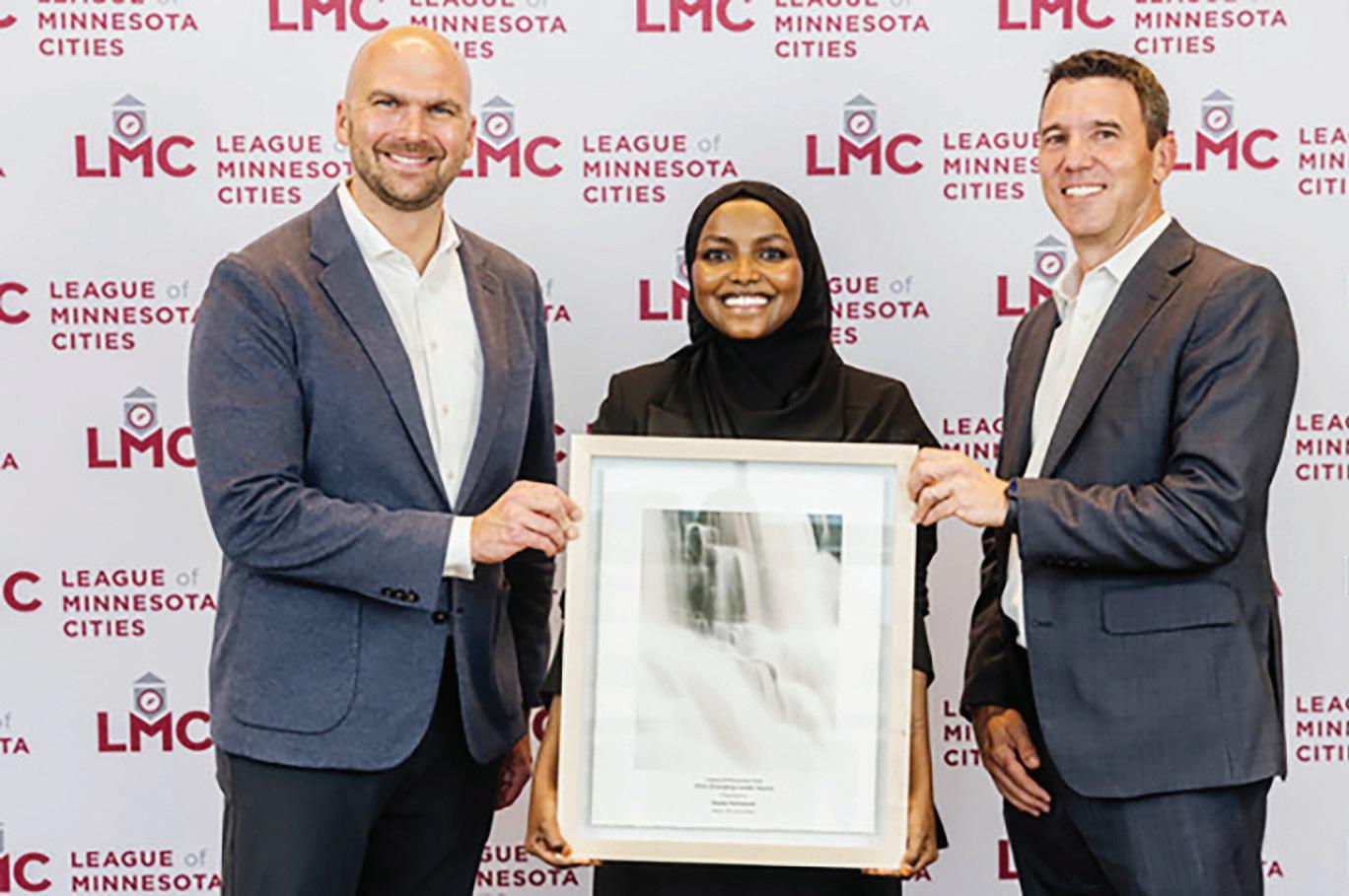
it means to be a public servant,” the St. Louis Park City Council said in a joint statement included in Mohamed’s nomination form. “She is a role model to us all in how to be authentic, show up as your true self, and lead with care and integrity.”
The League’s Emerging Leader Award is presented in recognition and encouragement of elected and appointed officials who are early in their service to municipal government, have made meaningful contributions to their city, and show
promise for continuing service and leadership. Officials who have served for eight years or less are eligible for consideration for the award.
As Mohamed concluded her acceptance speech she said, “My fellow mayors and council members, I am inspired by the work you do in your own communities It is a privilege to collaborate with you in this important work and to learn from each of you. Thank you all for this incredible honor.”
creed or


If you’re an ordinary American who goes to work to pay the bills or takes care of a loved one most days, it’s easy to feel down when you see the headlines about the 2024 election. Donald J. Trump has been convicted of 34 felonies for falsifying business records to cover up hush money he paid to bury an alleged affair with a porn star during the 2016 campaign, and the Republican Party continues to think he’s their best candidate. At the same time, President Biden is struggling to hold together his Democratic base as images of devastation in Gaza continue to dominate the news. Stories of good news in politics seem few and far between.
But as a preacher, I learned a long time ago that you don’t get to the good news by looking away from problems; the good news is most often found right amid trouble. Yes, politics is a mess in 2024. But, at the same time, several popular movements of everyday people struggling for economic justice have emerged that have the potential to reshape our politics. Against the backdrop of decades of rising inequality, low-wage worker movements have made huge strides since the pandemic, insisting that living wages are a moral issue for “essential workers” and seeing the largest increase in real wages in decades. Young people who’ve watched education and healthcare costs soar have come together to form effective coalitions for debt relief and won billions in loan forgiveness. Leveraging worker power, unions have waged effective strikes and negotiated new contracts while expanding to include new workers, especially in the South. Though they’re rarely in the headlines, these movements made up of millions of low-income workers have the potential to re-frame political debates for people who are weary of the status quo. The good news in 2024 is that poor and working people are the new swing vote in US politics.
A report from Lake Research Partners demonstrates just how powerful this untapped coalition of low-income voters could be. Looking back at the past three Presidential elections, they found that in the seven states that will likely decide the 2024 election—Arizona, Florida, Georgia, Michigan, North Carolina, Nevada, and Pennsylvania—low-income voter participation was an average of 12 percentage points lower than that of their higher-income voters. Using past averages to project 2024 turnout, this study measured the difference between the margin of victory in the last Trump/Biden matchup and the number of eligible low-income voters who are likely not to vote. In Georgia, for example, Biden won by almost 12,000 votes in 2020. In North Carolina, he lost by 74,000. But in both states, more than a million eligible low-income voters will likely not vote in 2024 if past trends continue.
That’s a huge potential swing vote, and the proportions are similar across the seven swing states in the study.
Since the 2024 Presidential race will likely be a rematch of 2020, this study used exit poll data from 2020 to ask who unlikely low-income voters would vote for if they did turn out in 2024. Of the 1.3 million likely nonvoters in Georgia, 746,000 would likely be Biden voters. Of the 1.1 million in North Carolina, some 594,000 would likely go for Biden. In short, Biden and other Democrats have a huge advantage among this demographic when they are able and willing to vote. The overwhelming takeaway of this study is that a relatively small increase in lowincome voter turnout in any of these seven states would dramatically increase Biden’s chances of winning a second term in the White House. The millions of lowincome people who’ve risen as leaders in movements for economic justice over the past few years have the power to decide the outcome of the 2024 election.
Celinda Lake and her research partners are consultants for the Biden campaign, and there is a focus on the potential for his candidacy in 2024, but the potential power of this swing vote is much larger than one election or even one political party. Both Democrats and Republicans have ignored low-income voters for decades precisely because they are unlikely voters. But when the nonpartisan Poor People’s Campaign, which I serve as a co-chair, surveyed poor people to ask why they don’t vote, the number one reason they gave was, “No one speaks to us.”
This is why our campaign has committed to holding a Mass Poor People’s and LowWage Worker’s Assembly in Washington, DC, on June 29th. We are bringing the everyday people who’ve demanded better wages from their bosses to Washington and insist that Republicans, Democrats, and Independents make clear what they will do to address the needs of 135 million Americans who are living on the edge in the richest nation in the history of the world. And we are committing to go home to our communities and reach 15 million of the unlikely low-income voters with the message that they have power in 2024. If they show up, especially in seven key states, their votes will decide the outcome in 2024. When they do, they will be able to help shape the reconstruction of an American democracy that works for all of us.
William J. Barber, II is President of Repairers of the Breach and author of the new White Poverty: How Exposing Myths About Race and Class Can Reconstruct American Democracy.

By Mike Stobbe Associated Press
U.S. health officials on Tuesday warned doctors to be alert for dengue cases as the tropical disease breaks international records.
The virus, which is spread by mosquitoes, has been surging worldwide, helped by climate change. In barely six months, countries in the Americas have already broken calendar-year records for dengue cases.
The World Health Organization declared an emergency in December, and Puerto Rico declared a public health emergency in March.
Dengue remains less common in the continental United States, but in the 50 states so far this year there have been three times more cases than at the same point last year. Most were infections that travelers got abroad, and officials note there is no evidence of a current outbreak. But they also warn that local mosquitos pose a threat.
In its health alert Tuesday, the Centers for Disease Control and Prevention advised doctors to know the symptoms, ask questions about where patients recently traveled and consider ordering dengue tests when appropriate.
Dengue (pronounced DEHN’-gay) is caused by a virus spread by a type of warm weather mosquito that is expanding its geographic reach because of climate change, experts say.
Many infected people don’t get sick, but some experience headache, fever and flu-like symptoms. Severe cases can involve cause serious bleeding, shock and death.
Repeated infections can be especially dangerous.
There are four types of dengue virus, simply known as 1, 2, 3 and 4. When someone is first infected, their body builds antibodies against that type for life. If they get infected with another type of dengue, the antibodies from the first infection may fail to neutralize the second type — and actually can help the virus enter immune cells and replicate.
That’s a concern in Puerto Rico, which for the last two decades has been widely exposed to type 1. Last month, the island reported its first dengue death of the year.
“We’re currently seeing is increases in the cases due to dengue 2 and dengue 3, for which the population has very little immunity,” said Dr. Gabriela Paz-Bailey, the Puerto-Rico-based chief of the CDC’s dengue branch.
There is no widely available medicine for treating dengue infections.

Vaccines have been tricky. U.S. officials in 2021 recommended one vaccine, made by Sanofi. The three-dose vaccine is built to protect against all four dengue types and is recommended only for children ages 9 to 16 who have laboratory evidence of an earlier dengue infection and who live in an area — like Puerto Rico — where dengue is common.
Given those restrictions and other issues, it hasn’t been widely used. As of late last month, only about 140 children had been vaccinated in Puerto Rico since shots became available there in 2022, and Sanofi Pasteur has told the CDC it is going to stop making the vaccine.
A different vaccine made by the Tokyobased pharmaceutical company Takeda is not currently licensed in the U.S. Others are in development.
Across the world, more than 6.6 million infections were reported by about 80 countries last year. In the first four months of this year, 7.9 million cases and 4,000 deaths have been reported, according to the World Health Organization. It’s been particularly intense in the Americas, including in Brazil and Peru.
In the United States, the numbers have been far more modest — about 3,000 cases last year in U.S. states and territories. But it was the worst in a decade, and included more infections that occurred locally, courtesy of native mosquitoes. Most were in Puerto Rico, but about 180 were in three U.S. states — Florida, Texas and California.
So far this year, there have been nearly 1,500 locally-acquired U.S. cases, nearly all of them in Puerto Rico.
Most cases in the continental U.S. continue to be people who were infected while traveling internationally.
It’s “a traveler’s nightmare” and a growing international concern, said Dr. Lulu Bravo, who studies pediatric tropical diseases at the University of the Philippines Manila and who has worked with
Takeda on its vaccine.
“When you have an outbreak in a country, tourists might not want to come,” Bravo said.
Ending racial injustice requires all of us to work together and take real action. What can you do to help?
Educate yourself about the history of American racism, privilege and what it means to be anti-racist. Educate yourself about the history of American racism, privilege and what it means to be anti-racist.
Commit to actions that challenge injustice and make everyone feel like they belong, such as challenging biased or racist language when you hear it.
Vote in national and local elections to ensure your elected officials share your vision of public safety.
Donate to organizations, campaigns and initiatives who are committed to racial justice.
By Chinedu Asadu Associated Press
ABUJA, Nigeria (AP) — West Africa’s divided regional bloc Sunday asked Senegal’s President Basirou Diomaye Faye to have a dialogue with the three military junta-led member states to try to reunite the region whose stability has been under threat following their decision to leave the group in January.
At its summit in Nigeria’s capital Abuja, the bloc — known as ECOWAS — appointed Faye as its envoy to meet with Mali, Niger and Burkina Faso, which formed their separate union after their respective coups fractured relations with neighbors.
It was not immediately clear what the terms of the dialogue would be. The Senegalese president, who became Africa’s youngest leader after his election victory in March, “has all the credentials required to serve as a facilitator,” Omar Alieu Touray, the president of the ECOWAS Commission, said at the summit.
The three coup-hit countries already said at their summit a day earlier that they have “irrevocably turned their back on ECOWAS.” It is the first time in the bloc’s nearly 50-year history that it has lost members in such a manner.

Analysts viewed Faye’s assignment as important during an unprecedented regional crisis. Still, it will most likely “not be fruitful anytime soon” because of regional tensions that remain, said Karim Manuel, an analyst for the Middle East and Africa with the Economist Intelligence Unit.
Touray said it is the worst time for the block for years. “Our region is also faced with the risks of disintegration,” he added.
“When you get out of an agreement, certainly you don’t become part of that agreement. If it is about free trade, free movement of people, the risk of losing those concessions remains,” Touray said.
In addition to economic projects that ECOWAS said it might have to suspend in the three countries if they do not return, their withdrawal could also affect their citizens. ECOWAS — as West Africa’s top political and economic authority — offers free trade and movement without visas within member states.
The three countries’ departure from the bloc could also affect neighbors on different fronts. They all share borders and deadly security crises that are now spreading across the region and which the bloc is seeking their partnership to fight. Observers have also warned the



coups in the countries could embolden other militaries, especially in countries where citizens have complained of not benefitting from their rich natural resources.
Nigeria’s President Bola Tinubu, who was asked to continue serving as the bloc’s chairman because his one-year tenure neared its end, called for stronger and new partnerships to develop the region amid its “enormous challenges.”
“Together, we can pave the way for a prosperous future for all of West Africa,’’ Tinubu said.
Black Caucus from Pg. 5
Deputy Chair Adriano Espaillat (D-NY13) subsequently released a statement to explain their reasoning.
“President Biden and his Administration have worked closely with House Democrats to make historic investments to positively impact communities across the country, including Latinos, such as investments to combat climate change, lower healthcare costs, expand access to healthcare for our veterans, and create jobs with the infrastructure bill,” the two shared.
Although Biden has received the affirmation of many over the past few days, Reps. Mark Takano (D-CA-39), Adam Smith (D-WA-9), and Joe Morelle (D-NY-25) have been publicly adamant about Biden dropping out of the race.
Others like former Speaker of the House Nancy Pelosi (D-CA-11) have remained moderate and encouraged others to hold out fate until after Biden’s performance at NATO this week.
“I want him to do whatever he decides to do. And that’s the way it is. Whatever he decides we go with,” Pelosi said on Morning Joe. “Let’s just hold off. Whatever you’re thinking, either tell somebody privately, but you don’t have to put that out on the table until we see how we go this week.”

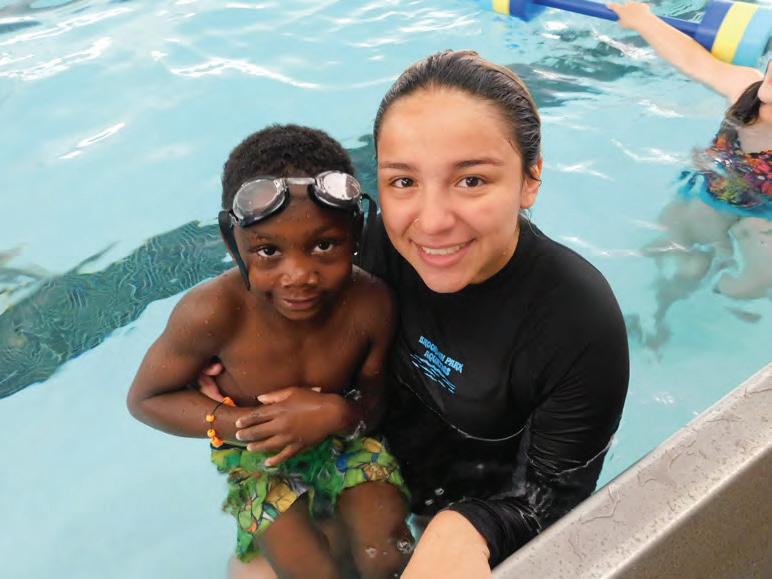
By Tom Gitaa Mshale
couple dozen Kenyan Americans and their children gathered at Centennial Park on Sunday and issued a statement calling for the resignation of Kenya’s president as they chanted “Ruto must go.”
AThe call for President Ruto’s resignation comes days after he activated the country’s military to protect his regime, following the storming of parliament on Tuesday by youth protesters over a tax plan that would increase the cost of living. The storming was an attempt by the youth, commonly referred to as Gen Zs, to stop lawmakers from approving the budget bill.
The Kenya National Human Rights Commission, a government agency, on Friday said 23 unarmed people had been shot dead by police and hundreds of others injured due to police brutality. Over 50 people have also been arrested, although observers believe the number of dead and those arrested could be much higher.
The activation of the country’s military to patrol Nairobi, East and Central Africa’s largest city, came on the day the youth-
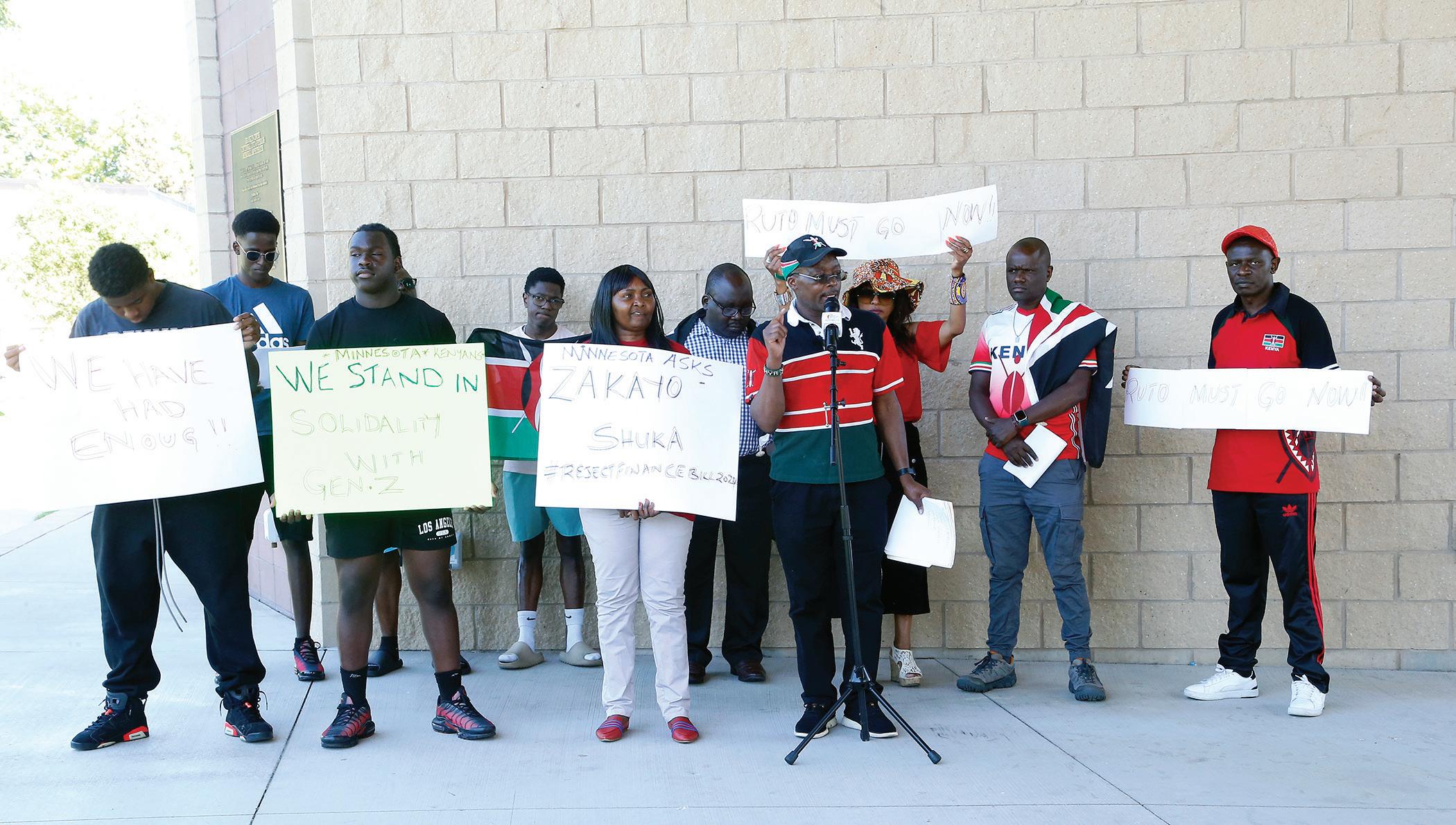
led movement had signaled that their next target, after the successful storming of parliament, was the president’s official residence which was to happen on Thursday.
Following the military deployment, protests were more muted and the storm-
ing which was being organized under the hashtag #OccupyStateHouse did not happen.
On Sunday, protestors in Brooklyn Center stood on the steps of the pavilion at Centennial Park carrying signs calling for Ruto’s resignation and a rejection of
the government finance bill.
Cosmas Onyambu, a teacher and social worker in St. Paul, Minn., read the 6-page statement on behalf of the

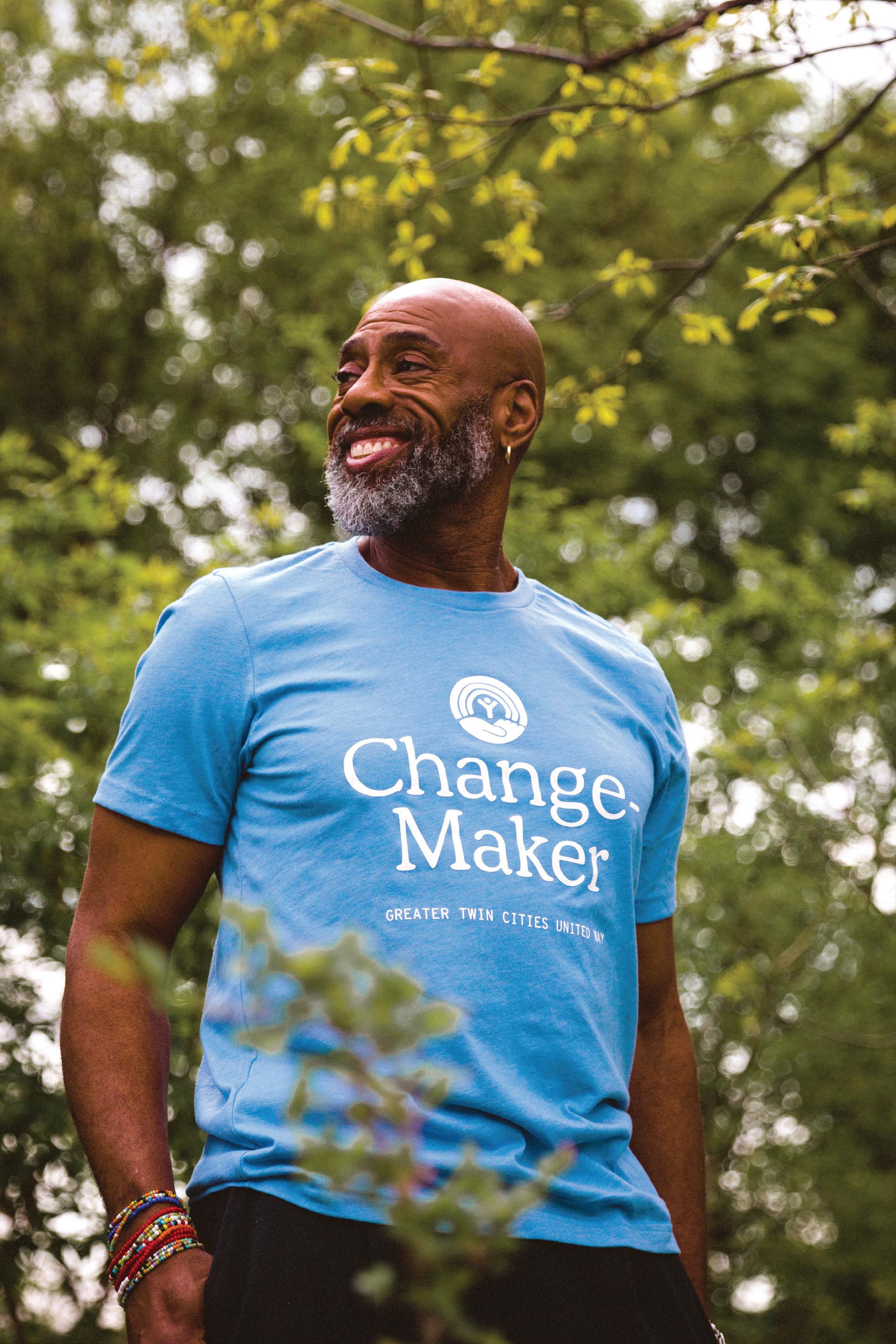
We live in a world where divisions and poverty affect everyone but when we unite as changemakers we can create a community where all people thrive.
gathering.
“Kenyan citizens residing in Minnesota have watched in disbelief as peaceful demonstrations led by our youth, commonly referred to as “Gen Z,” have been met with violent and criminal responses from the police. The protesters were peaceful, chanting “We are peaceful,” yet the police attacked them with water cannons, tear gas, and live bullets, resulting in many deaths and injuries. This is a profoundly regrettable occurrence,” Mr. Mayaka said.
“President William Ruto’s 2022 campaign promised food security, support for small and medium businesses, improved housing, healthcare, a digital superhighway, a creative economy, and better public services. None of these promises have been fulfilled. Instead, his administration has embarked on a campaign of mass impoverishment, borrowing heavily without delivering corresponding development projects. In less than two years of his presidency, President William Ruto has borrowed more and spent less in development than his two predecessors despite collecting much more taxes thus creating and imposing a tax menace on Kenyans,” he said. “By June 2023, Kenya’s gross debt had soared to Ksh 10.19 trillion, with no visible benefits for the people.”
The Sunday statement also included “10 non-negotiable actions,” among them the resignation of Ruto.
As he watched the youth-led protests unfold online, 18-year-old Tony Machoka finally had enough. He started asking his dad what he could do, and that is how he found himself at the Sunday event carrying a placard that read “We have had enough.”
Machoka grew up in Thika, a town just 25 miles from Nairobi. He moved to Minnesota when he was 16 for his last two years of high school, which he wrapped up last month. He said it has been traumatic to see familiar streets in Nairobi being patrolled by the military and heavy teargas been lobbed at peaceful youth protestors.
“I have spoken with some of my friends back in Kenya and they are saying it’s really bad, so sad to see all these pictures of people being shot at by police” Machoka said. “Ruto just wants to tax everything, even those who have nothing, he has to go.”
“It is unacceptable what Ruto is doing to our country, I am here to send my condolences to the mothers who have lost their children,” said Domitila Mwandau who attended the event carrying a sign that read “Ruto must go now.” A mother to five Gen Zs, she said she is grieving with the mothers in Kenya.
After the Sunday event, Henry Ongeri, a Twin Cities attorney who ran unscuccefully for governor in his native Nyamira County in Kenya two years ago and helped organize the Sunday event, said calls for Ruto’s resignation are getting more urgent by the day.
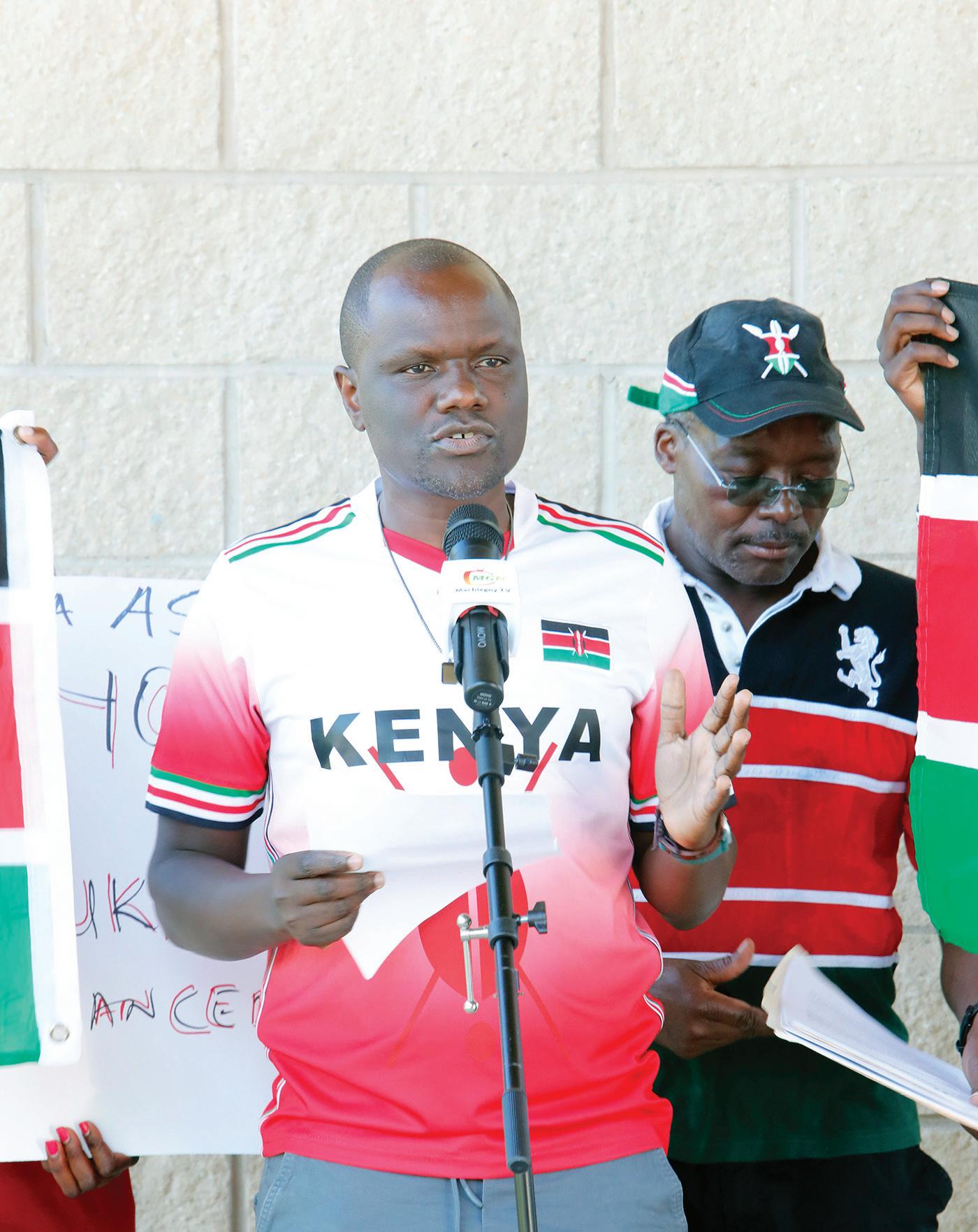
“We are going to continue this pressure until Ruto goes, and the finance bill is gone for good, those two things have to happen before we stop,”
said.
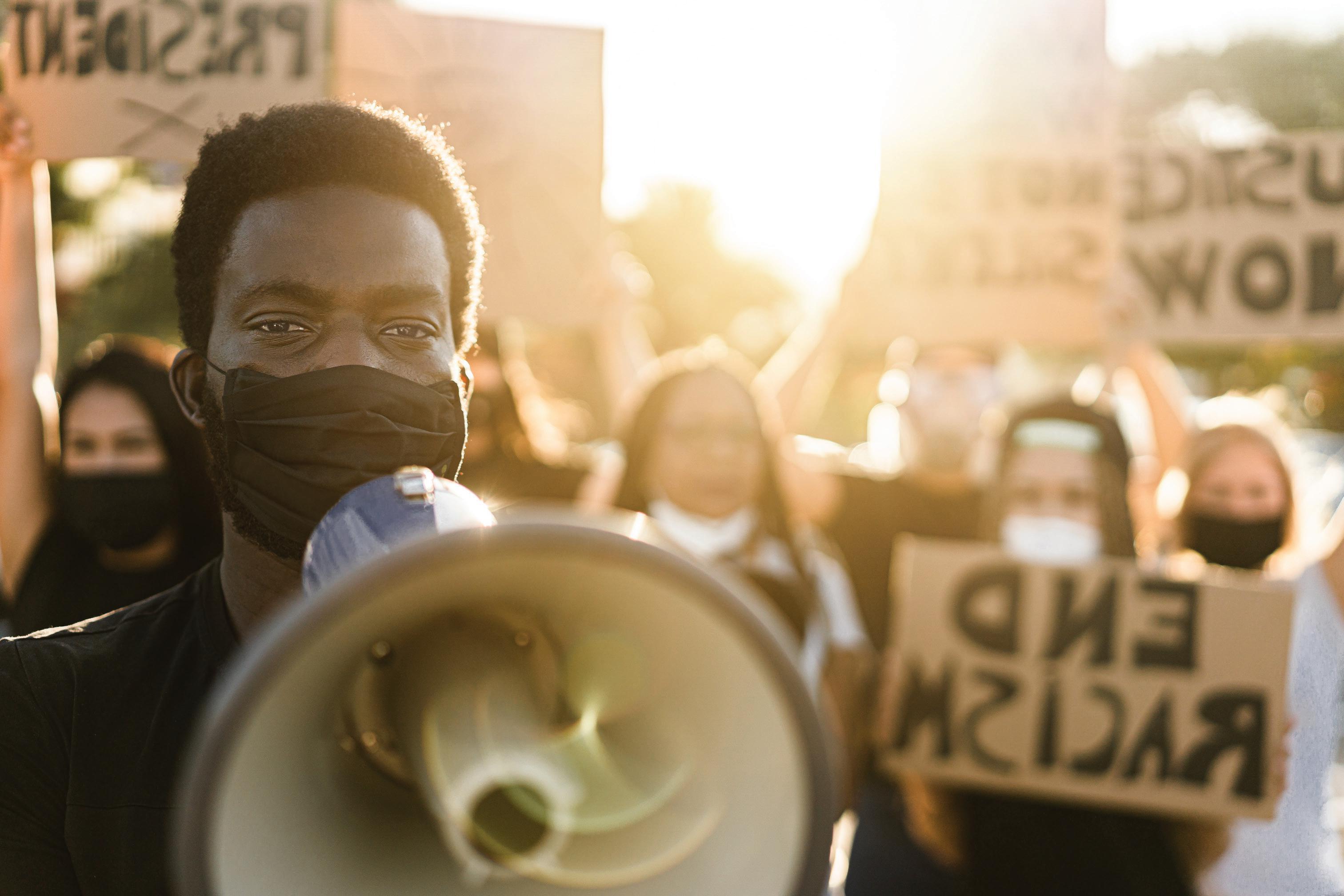
By Daoud Kuttab Religion News Service
On a trip to Jordan in February, Afsoon Roshanzamir Johnston, the first American woman to medal at the world championships in freestyle wrestling, met and coached a team of young Jordanian female wrestlers, some of whom have to decide between competing and violating their religious commitment to cover their heads and shoulders in public.
One young woman, she recalls, set her on a quest to change that.
“I saw myself in her,” said Roshanzamir Johnston. “She loves the sport of wrestling and I wanted to provide the opportunity for her and others in the world.”
On her return to the U.S., Roshanzamir Johnston assembled a committee of designers and manufacturers to come up with a proposed uniform that meets the requirements of the organizations that govern wrestling competitions internationally, as well as those of observant Muslim women.
Any design would have to achieve two basic goals to get past regulators at United World Wrestling, in Switzerland. “The gear had to be tight” so as not to allow a finger of the opposing wrestler to be caught in looser fitting cloth, said Roshanzamir Johnston. At the same time, it was crucial that there not be multiple layers of loose fabric to cause slippage, allowing the covered wrestler an advantage in working out of wrestling holds.
Working with Tim Pane, CEO of MyHouse Sports Gear, a Scranton, Pennsylvania, company that makes conventional women’s wrestling singlets, and former clothing designer Melissa Veselovsky and Usman Shahbaz, My House’s head of manufacture in Pakistan, Roshanzamir Johnston soon produced a prototype, which she calls Cultural Religious Compliance Gear.
Mohammed Awamleh, head of the Jordan Wrestling Federation, told Religion News Service that the Arab Wrestling Federation is hoping to be able to present a final version of the singlet in August, when the under-17 world championships will be held in Amman, and that some women might practice in one of the three draft versions that have been created.
The effort is being supported by USA Wrestling as well. “USA Wrestling is proud and honored to work alongside such a strong wrestling ambassador as Afsoon Johnston on purpose of making our sport accessible to all,” said Rich Bender, the
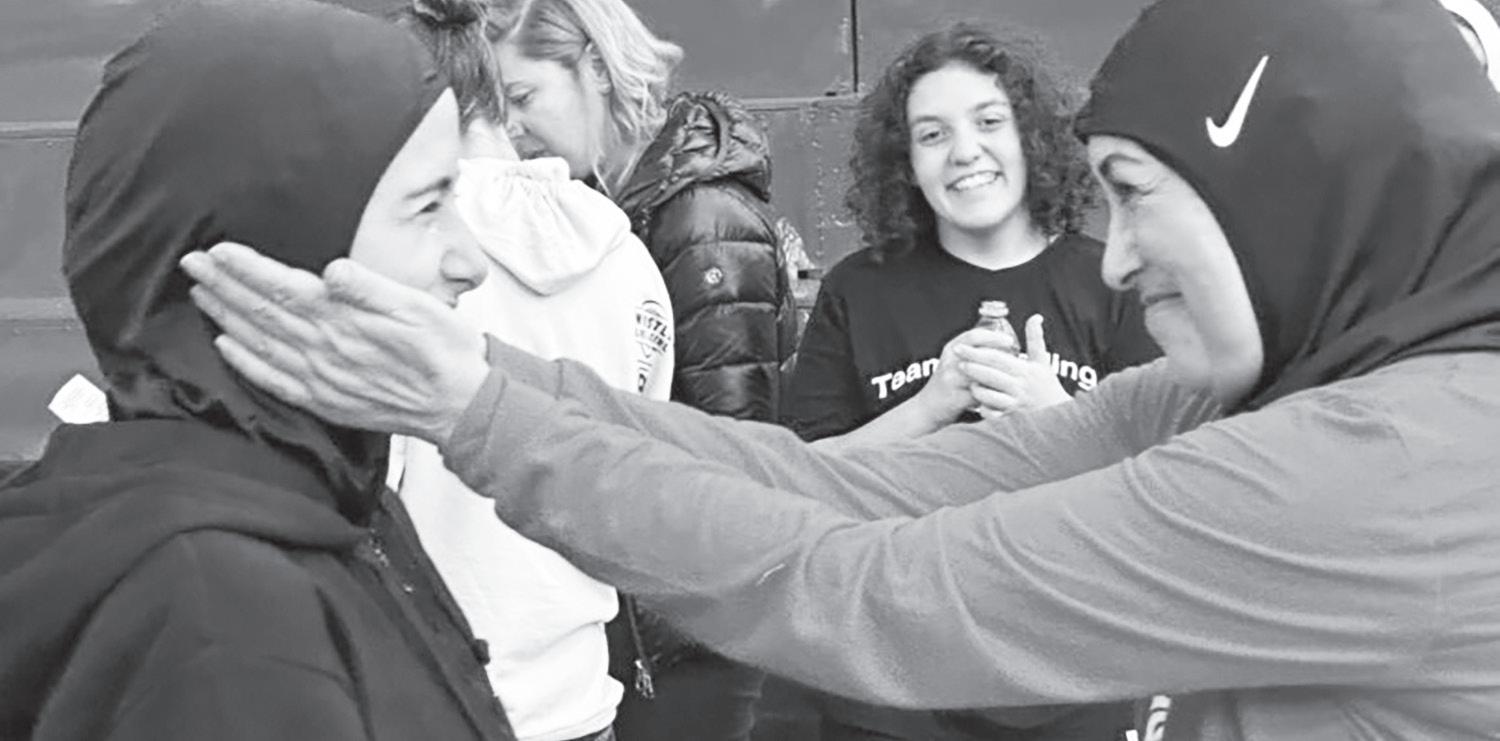
organization’s executive director, in a statement.
Roshanzamir Johnston was born in Iran, where her father, the Iranian wrestler Manu Roshanzamir, taught her the moves she was not allowed to even watch under the Islamic Republic’s modesty rules. After the family fled the repressive regime in 1983, she joined the wrestling team at her high school in San Jose, California. She was a member of the first women’s team to wrestle internationally, at the 1989 World Championships, taking home a bronze. The next year, she won silver.
By the time women’s wrestling became an Olympic sport, in 2000, she had retired, but she has stayed involved in the sport. (She coached the USA women in the 2016 Olympics in Rio de Janeiro.)
Her February visit to Jordan, in the company of other past U.S. champions, was aimed at kickstarting interest in women’s wrestling in the Arab region and was the result of hard work by Dan Russell, executive director of Wrestling for Peace. Russell, who lives in Amman, said wrestling provides tools to help navigate life’s larger challenges, for both girls and boys.
“We believe everyone should have the opportunity to learn and grow through wrestling,” said Russell. “Our project is dedicated to supporting the inclusion of appropriate clothing and covering options which adhere to cultural and religious values, enabling more girls to participate in the sport.”
The Jordan Wrestling Federation honored Russell at the close of the 2024 Asian championships on June 30 for his work in helping find solutions to the inclusion of women in world wrestling.
Wrestling for women has been burgeoning in Jordan, whose King Abdullah was also a high school wrestler. The country’s wrestling federation, which had been dormant for 15 years, reestablished a national team for girls and women in 2022, providing the opportunity for them to participate in local and international competitions.
Awamleh said that since then the number of female wrestlers in Jordan has increased to almost 40, including the 10 women on the national wrestling team.
If the new singlet is successful, it will be a second time Jordan has been behind a sports breakthrough for Muslim women. In May 2012, at the inaugural Muslim Women’s Sport Foundation Ambassador Awards in London, FIFA, the world soccer federation, honored Jordan’s Prince Ali Bin Al Hussein for his efforts to overturn the sport’s ban on the Islamic headgear.

By Kai Mora
On June 26, Seun Kuti and Damian Marley released “Dey” –jazzy, funky, and indicative of the sound that defined Nigerian star Fela Kuti’s Afrobeat.
Seun, Fela’s youngest son, has been carrying the mantle of his father’s sound since his death in 1997. Seun first appeared alongside his father in 1991 at the Apollo Theater in Harlem in New York City. He officially “inherited” his father’s band, “Fela & Egypt ’80,” at the young age of 14, though his earliest records would come only in the following decade. Despite the formidable legacy of his father, Seun has consciously made an indelible mark as an artist in his own right. He has collaborated with a variety of notable artists from Carlos Santana (“Black Times,” 2017) to Janelle Monae (“Float,” 2023), as well as half of hip-hop group “The Roots,” Black Thought and VIC MENSA (“Bad Man Lighter 2.0”).
In a 2011 interview with The Guardian, Seun said he had declined the leading role in the hit Broadway show Fela! because, “It would just give ammunition to those who say I am copying my father.” However, he nevertheless honored his father’s legacy when he released his first album, Many Things, under the name “Seun Kuti and Fela’s Egypt 80.” And while Seun continues to create space for himself as an artist, his music and persona is undeniably influenced by his father.
This is a fate shared by Damian Marley, also the youngest son of his father, the legendary Jamaican reggae star Bob Marley. At the same time, while Seun got to spend time as a youth with his father at the Kalakuta Republic, Damian was just two years old when his father died. Nevertheless, Damian was immersed in the musical culture not only created by his father, but of the myriad other reggae, ragga, and dancehall artists based in Kingston, Jamaica. Yet, like Seun, he developed his own sound, which, while honoring the roots reggae sound of his father, has ventured out into the sounds of hip-hop, rap and reggaeton, as well as various forms of African music. This collaboration with Seun is part of Damian’s ongoing engagement with music on the African continent, from Ethio-jazz influence on his 2010 collaborative album with Queens rapper Nas, As We Enter, to recent collaborations with contemporary African artists like Burna Boy and Afropop Board of Directors member Angelique Kidjo (“Different,” 2019) as well as Wizkid (“Blessed,” 2020).
Fela Kuti and Bob Marley were both at the explosive beginnings of their careers in the 1970s, and while there was never a collaboration between the two artists, the common denominator is the political and social quality of their art, a characteristic passed on to both Seun and Damian. Fela and Bob carried their Pan-African doctrine from alternate sides of the Atlantic in their music, but a certain spirituality, unconventional but certainly attractive, was embedded in both of their music. In tune with the 1970s atmosphere, their

lyrics were socially and politically charged, lambasting corrupt politics in their native nations and abroad. Fela’s Kalakuta Republic compound was reminiscent of the Rastafarian compounds that, ironically, characterize apolitical Rastafarian sects who opted for separation and steadfast patience for deliverance rather than direct engagement with corrupt politics. Then again, the Rastafarian compounds were also extensions of the self-ruling maroon communities of early modern Jamaica, which maintained freedom alongside, but hidden from, a British colonial society. Thus, between Fela and Bob there was a spectrum of social and political awareness and activism.
These influences are heard in Seun and Damian’s music, and certainly in “Dey.” Damian’s “chatting” or “rapping,” complements Seun’s saxophone. Damian lyrically opens the song with, “love, love, love, love!” and the listener might assume through the bright music that it will be a record that speaks of idyllic peace and unity or perhaps about sweet-nothings. Yet, midway through, Seun refrains,
“This world is full of romance, this world ain’t got no love”
The song’s lyrics offer a critique of superficial attraction in relationships on social media, and with the self. Yet the voices of both Seun and Damian are all but drowned out behind the cacophony of instrumentation suggesting that really, themusic is the message. While lyrics are central fixtures to the legacies of both reggae and Afrobeat, it is the broader sonic atmosphere that provides the supercharge. This is why genres like reggae and Afrobeat can imbibe diverse lyrical messages while the sound remains consistent and identifiable, signifying connection to a revolutionary era.
Sonically, Afrobeat and reggae are both informed by sounds and music technologies coming out of the United States. American Rhythm & Blues was the most popular genre in 1950s Jamaica, influencing the development of a national sound known as ska, which evolved into rocksteady and then into reggae. And while reggae remained a characteristically Jamaican genre, there was a distinction
made between Bob’s sound, which resonated with European and American audiences, and the more rough-edged music that became more popular within Jamaica, suggesting that Bob’s sound was still in some ways shaped by the Western ear. At the same time, in Jamaica, musical equipment from the United States was being imported into studios, and the foundation for what became the reggae subgenre dub, and later dancehall. While reggae took the United Kingdom by storm, dub would become part of the foundation for American hip-hop in the 1980s as Jamaican immigrants settled across New York City.
While Bob was meeting success across Europe and the United States in the ‘70s, Fela had reworked his band as Nigeria ‘70 while traveling through the Black Power U.S. in 1969, developing a relationship with Black Panther Party member Sandra Smith Isadore. Fela’s own mother, Funmilayo Ransome-Kuti, also imbued his musical formation with political consciousness. Funmilayo was famously an activist in the 1950s during the first wave of African independence movements from Algeria to Ghana. Fela’s formative years in music were also profoundly shaped in the late ‘50s by his experience in London where he was exposed to jazz music, including John Coltrane, Miles Davis and Sonny Rollins.
Seun in many ways carries on the sonic atmosphere of his father’s work. The legacy of political activism is tethered to the legacy of the music. The specter of his father’s artistic and political legacy is also reflected in the fact that Nigeria was run for over 18 years after Fela’s death by the People’s Democratic Party (PDP), led by military official-turned-presidents, Olusegun Obasanjo and Muhammadu Buhari, who were antagonists towards Fela and his politics. It was Fela’s vocal defiance in his struggle against corrupt politics in Nigeria that garnered the ire of such powerful officials.
Seun’s artistic activism is thus a direct legacy of his father’s, and part of the ongoing evolution of Nigerian politics and art. Yet Bob and Fela had distinct approaches to politics; while Fela was in a sense honored to have Nigeria’s
politicians as enemies, Bob’s diplomatic nature could arguably be ascribed more to his Rastafarian reverence for Ethiopian Emperor Haile Selassie I. Selassie was noted for his diplomacy and dexterity in conflict resolution between African nations. He was a co-founder of the Organization of African Unity (1963). Bob at one point similarly became a mediator between the warring political factions, an experience that transformed the lay Jamaican into a kind of mercenary, a legacy that still haunts Jamaican politics today. Bob famously made opposing politicians Michael Manley and Edward Seaga hold hands at the 1978 “One Love Concert,” and he constantly called for peace in Jamaica, a position that almost cost him his life in 1976 in a shooting that officially sent him into a self-imposed exile in Europe.
Damian also carries the airs of his father’s sonic atmosphere, which, despite its simple yet defining “one-drop” sound, carried with it revolutionary messages of revolution, liberation and love. Indeed, many people now associate reggae with themes of relaxation, marijuana, and good vibes thanks to hits like “Positive Vibration,” (1976), “Three Little Birds” (1977) and “Jammin’” (1977). But these were few amid a sea of songs with far stronger messages like “War” (1976), “Exodus” (1977), “Burnin’ and Lootin’ (1973) and “Them Belly Full” (1974). Damian himself has expressed fondness for his father’s “grittier” sound, and this can be audibly observed in his sampling and remixing of some of Bob’s most politically charged songs, including “Crazy Baldhead”/“Me Name Jr. Gong” (1976/1996) and “Slave Driver”/“Catch a Fire” (1973/2001).
Whatever approach they chose in their music and politics, Bob and Fela both left lasting legacies that Seun and Damian have carried on in their unique ways. Head-on engagement with politics seems to be an art of the past for the entertainment world. Seun and Damian nevertheless implore their listeners to be wise to the corruption of society and the corruption of oneself in their collaboration “Dey.”









